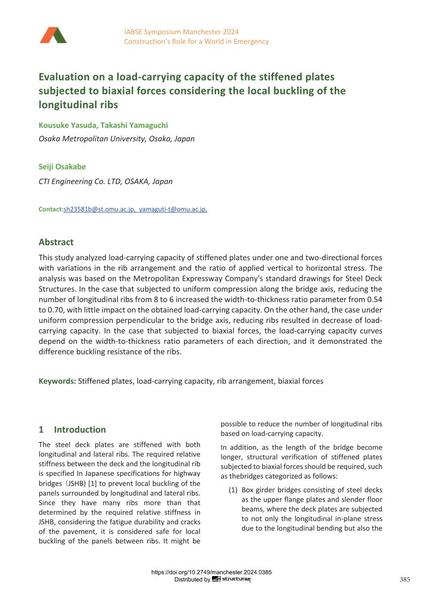Evaluation on a load-carrying capacity of the stiffened plates subjected to biaxial forces considering the local buckling of the longitudinal ribs

|
|
|||||||||||
Bibliographic Details
| Author(s): |
Kousuke Yasuda
(Osaka Metropolitan University, Osaka, Japan)
Takashi Yamaguchi (Osaka Metropolitan University, Osaka, Japan) Seiji Osakabe (CTI Engineering Co. LTD, OSAKA, Japan) |
||||
|---|---|---|---|---|---|
| Medium: | conference paper | ||||
| Language(s): | English | ||||
| Conference: | IABSE Symposium: Construction’s Role for a World in Emergency, Manchester, United Kingdom, 10-14 April 2024 | ||||
| Published in: | IABSE Symposium Manchester 2024 | ||||
|
|||||
| Page(s): | 385-392 | ||||
| Total no. of pages: | 8 | ||||
| DOI: | 10.2749/manchester.2024.0385 | ||||
| Abstract: |
This study analyzed load-carrying capacity of stiffened plates under one and two-directional forces with variations in the rib arrangement and the ratio of applied vertical to horizontal stress. The analysis was based on the Metropolitan Expressway Company's standard drawings for Steel Deck Structures. In the case that subjected to uniform compression along the bridge axis, reducing the number of longitudinal ribs from 8 to 6 increased the width-to-thickness ratio parameter from 0.54 to 0.70, with little impact on the obtained load-carrying capacity. On the other hand, the case under uniform compression perpendicular to the bridge axis, reducing ribs resulted in decrease of load- carrying capacity. In the case that subjected to biaxial forces, the load-carrying capacity curves depend on the width-to-thickness ratio parameters of each direction, and it demonstrated the difference buckling resistance of the ribs. |
||||
| Keywords: |
Load-carrying capacity stiffened plates rib arrangement biaxial forces
|
||||
